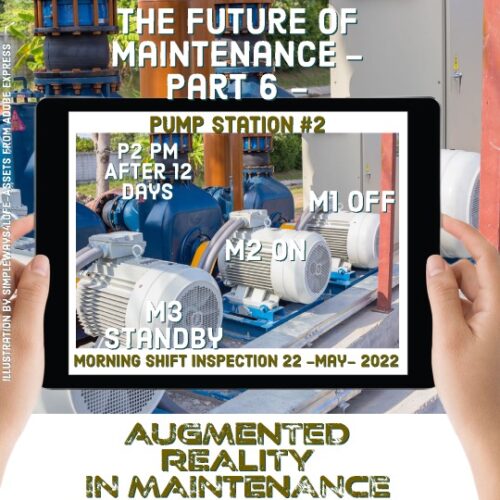Simply, systematic can be defined as “acting according to a fixed plan or system; methodical”. We can take out “fixed” for now and focus on acting according to a plan. Acting according to a plan implicitly indicates that you have a plan. A plan means “detailed proposal or map for doing or achieving something”. So, you have studied what you are about to do and you made a plan. The plan simply includes what is your targeted result. And, the steps you are going to take to reach this result.
This concept applies equally if you are planning for the next meal, the next summer vacation or to improve maintenance performance. In all cases you have a main target and secondary ones. Being recognized for the good job you had done is usually one of the important secondary targets. This can be only by yourself -if you are planning for something personal. However do not raise the importance of admiration to make it a primary target. This will empty the target from the added value for others.
Start by defining and believing in the end target e.g. in RCM
Frankly, if you don’t have a clear target then your plan won’t be robust. Moreover, you won’t gain enough support. Also, if you don’t believe in the value that your target will add, don’t rely on the enthusiasm that you will receive from the others. Even you, you won’t have motivation to follow the plan. So, in case the series of articles we had presented under the title “Reliability made easy” starting from https://simpleways.life/1-reliability-made-easy-reliability-and-its-synonyms/ motivated you to apply RCM in a pilot area in your workplace; Ask yourself “What shall I achieve by applying RCM?”. We had also, made a video series for that. You can find it on our YouTube channel “Simple Ways 4 Maintenance” in the Playlist of “Reliability Made Easy“
What shall I achieve by systematic application of RCM?
As we said above you have a plan or you follow a systematic approach to achieve something. So what you can achieve by applying RCM?
Better Safety and Environment
Usually we follow whatever rules are there for the safety and environment. When we try to apply RCM we need to focus on the safety and environment effects of this failure. That’s in order to rate the effect of the failure. So must we take an action that can be to redesign or we can reach a conclusion of “No scheduled maintenance”? Focusing on any aspect will make us more aware of it. Just being aware of anything, you will see more of it and then you can take a better approach towards it.
Better Operational results
When you focus on the failures that have the higher effect. This higher effect can be longer stoppage time, more lost products, degradation in quality, degradation in production speed, etc. If we manage to focus the efforts of the maintenance team on the high value tickets or tasks, this will make a boost to the production operations.
Focus on key equipment
The analysis will highlight the equipment that are critical for operations. Those are the equipment that their failure results in higher operational costs. Then, your focus will be naturally drawn to those equipment. This can also support the RCM team when they are just starting to select pilot areas or equipment that would generate a valuable achievement. This will enhance the trust and the believe in the worthiness of the RCM project.
Better Systematic maintenance cost
Here we refer to your scheduled and continuously running maintenance activities. When you have the time to check the feasibility of each task; You would be in a better position to take some decisions around it. The core point of the analysis is whether the cost of maintenance is less than the cost of failure or not. Surely, The cost of the failure is amended by the effects on health, safety and environment. Also, the maintenance cost is adjusted by the induced secondary failures that result from one hidden or visible failure. As the failure effects of the hidden failure, and the failures that approach health, safety and environment push up the cost of those failures. However, normally those failures are really few in number. The majority of the systematic maintenance tasks won’t have health, safety or environment effects.
The majority of failures has either operations effect or no operations effect. The “no operations effect” is usually an interesting term to demystify. Those failures occurs to equipment that have hot standby or won’t cause an immediate stoppage to operations. So, the “no operations cost ” is the total cost of maintenance including manpower, parts and consumables. The RCM targets analyzing then rationalizing those tasks. When this result is achieved, the cost is directly reduced by less parts, manpower and stoppage time for scheduled maintenance.
Engaged team
When you understand something better, then you have buy in to the results that you have personally achieves. Well, it goes both ways. Being biased to what you have done can be seen as a reason to overlook other results or previous tasks set by others. On the other hand, when you are sure about why we need this task, why this task is having a higher priority or, why we will cancel this task, then your buy in for doing/ not doing will grow deeper inside you. Moreover, you would advocate the results of the analysis that you were part of. And, convince others about it
Better Teamwork
We had already spent together a considerable amount of time studying, analyzing and reaching common understanding. Then when we go to the execution it would be easier because we had already reached a point where we understand and trust each other. We can reach better, easier and commonly agreed solutions to the common problems that arise usually between different teams. The operations, maintenance, purchase, store, supply chain and safety teams are now able to speak together in a language that they all will understand.
Systematic Building of you database
That’s one of the overarching achievements that would have long term benefits. Having a reliable database of the failures that we feed with enough clear data is a great bonus achievement. The value of this growing and trustable database will grow with time. We shall have source of information that we can rely on to take informative systematic decisions.
In conclusion,
Mere systematic execution for the maintenance task won’t bring better results tomorrow for maintenance and operations. But, having no systematic maintenance system to follow will result in a chaos. So we need to build a conscious systematic maintenance system where we are all sure why we do this task, why we do it less or more frequent or, why we let it fail. In coming chats we shall speak about the plan part of the systematic definition and why the word fixed creates a confusion?
If you feel you need help with any of these ideas we discussed, request a Management Consultancy or Coaching Services From our Store









2 Comments